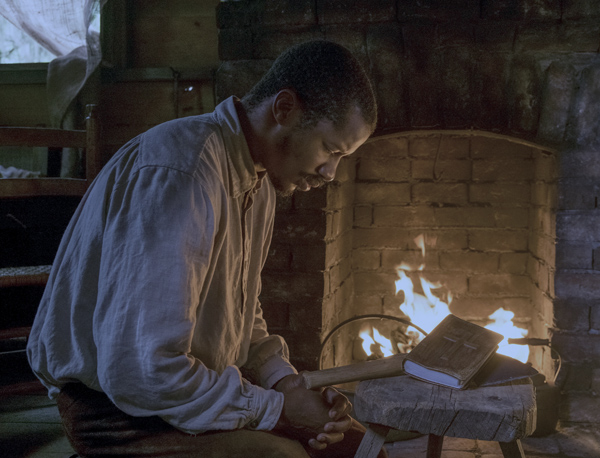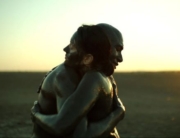Perhaps no other film this year arrived with as much expectation (i.e., hype) and coverage as The Birth of a Nation. It premiered at Sundance last January, won a Grand Jury Prize and an Audience Award at the festival, and earned additional headlines when Fox Searchlight snapped up the North American distribution rights for $17.5 million.
But by the end of the summer, the tenor of the conversation surrounding the film changed. It was no secret that writer, director, and star Nate Parker had been charged and tried, along with Jean McGianni Celestin (who co-wrote Birth‘s story), with raping a fellow student at Pennsylvania State University in 1999. Although Parker was acquitted of the charges in 2001, Celestin was indicted, though his conviction was overturned on appeal.
Additionally, the woman at the center of the case filed a complaint against the school for its “inadequate response” to sexual harassment by Parker and Celestin, which the suit claimed came about as the result of her pressing charges against them. She was awarded $17,500, and in August, Variety published a story revealing that the woman had committed suicide in 2012.
One is able to tune out the off-screen news and simply focus on the movie, at least during its first hour as Parker confidently sets up the groundwork for his biopic of Nat Turner and the 1831 slave revolt he led in Virginia. By focusing on the time and place, Parker clearly establishes the strata of Southern antebellum society. The film is at its best and its most involving in several compact, hard-hitting set pieces, such as when Turner’s father’s steals food to feed his hungry family or, decades later, when Turner, now an adult, is struck for speaking to a white woman.
However, by the midway point, there are reminders that this is the work of a first-time director making a small-scale epic. After the sweeping overhead shots of the first half, the camera becomes grounded, showing signs of a low-budget, “hurry-up-and-shoot” production, with scenes simply, and statically, shot. Also, the characters begin falling into types, with one exception (more on that later). As in many movie bios, the main figure is depicted not only as the catalyst of an event—here an attack against slavery—but as the sole personification of the movement.
The film begins as a clear-eyed, unflinching, and on-point portrayal of slavery, but gradually Parker leans toward Steven Spielberg’s school of inspirational filmmaking. The swelling score becomes intrusive, accompanied by an angelic children’s choir, even during the violent showdown. (Similarly, after Turner’s arrest and incarceration, he’s bathed in light in his prison cell.)
Despite the subject matter, the script doesn’t dive deeply into the psychological effects of armed violent conflict. The historical fact that white women and children were among the casualties of the rebellion is neither seen nor heard. The movie simply doesn’t offer introspection or contradiction that would lessen its overwrought finish, with its excessive musical score and close-ups.
Here and there, though, the film makes sharp observations, such as when Turner’s owner, Samuel Turner (a composite figure played by Amie Hammer), gives his little sister a slave as a birthday present. The white teenager claps her hands in glee as Cherry (Aja Naomi King), who becomes Turner’s wife, is presented to her. Perhaps the film’s most complex character is Elizabeth Turner, the mother of Turner’s owner, who is not unlike 12 Years a Slave‘s plantation mistress (Sarah Paulson): a victim, abuser, and Southern matron balanced atop a wobbly pedestal.
This mistress of the manor teaches Turner how to read—as long as it is just the Bible, as the rest of her library is for white folks. He goes on to read scriptures at the plantation’s church, and Elizabeth, with beaming pride, watches from the front pew as Turner, a boy of about 10, becomes a scripture-quoting preacher. (Whatever dramatic licenses that were taken to mold Turner’s largely undocumented early life into a narrative, there’s one noticeable error: No Protestant church in the rural South at that time would likely have Roman Catholic imagery—a Sacred Heart of Jesus painting—above the altar.) In Penelope Ann Miller’s performance as Elizabeth, much is left unsaid. The depth to her conflicted character is not revealed in the dialogue but solely through her subtle reactions to her surroundings.
Her portrayal stands in contrast to the depiction of Cherry. In a scene that might cause discomfort for reasons that have nothing to do with what is on-screen, Turner’s wife is raped by four white men off-screen and left bloodied and beaten to a pulp. As events unfold and pick up steam, it’s difficult to gauge the time line of events (or what exactly happened to Cherry, for that matter) because she remains bed-bound for the remainder of the film, seemingly for months, which limits and incapacitates her role.
Though she first pleads with her husband not to seek revenge against her rapists, she relents and gives her blessing for him to go on the offensive after he, too, has been whipped with such ferocity that his back has been shredded—his punishment for baptizing a white man. Yet her consent, given in softly spoken dialogue as Cherry can barely move her head, comes off as passive, more victim than collaborator. Turner’s scenes at her bedside have a hushed, deliberate pace, one of the reasons for the film’s flagging midsection, though it accelerates once Turner and other slaves begin plotting to strike back against their abusers.
Based on the film’s mixed critical reception, the conversation hasn’t swung back to the movie’s euphoric reaction at Sundance. As of now, The Birth of a Nation, based on its merits, can’t completely rewind the clock back to January.

















Leave A Comment